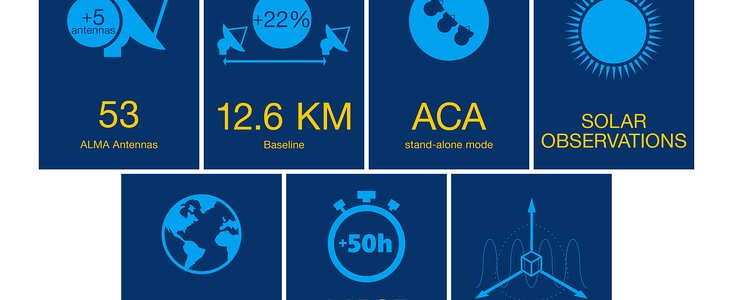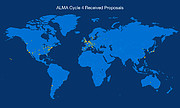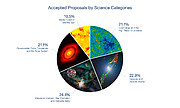Meddelelse
Record Amount of Time Requested in Cycle 4 Proposals for ALMA
23. august 2016
A record amount of observing time was requested by the international astronomy community under the call for proposals as part of Cycle 4 at the Atacama Large Millimeter/submillimeter Array (ALMA). The high demand for this revolutionary telescope was reflected in 50% more requested hours compared to the previous ALMA cycle.
Over 400 astronomers were granted observing time with ALMA, the most powerful radio telescope on Earth. The selection process took almost five months, with specialists from around the world meeting in Vienna, Austria, last June to evaluate the 1571 proposals for observing time. The 145 science advisors of the ALMA Proposal Review Committee met for a week to establish the criteria and a ranking to make the selection of proposals as objective as possible. This involved considering the many different aspects that determine the scientific importance and technical feasibility of a project, as well as its likelihood of success. The experts then conducted an exhaustive review of each proposal based on these criteria.
The total amount of observing time represented by the 1571 correctly submitted proposals from more than 30 countries came to 18 630 hours (12 285 hours for the 12-metre Array and 6345 hours for the Compact Array). In total 3000 hours for the 12-metre Array and 1800 hours for the Compact Array were allocated.
The category with the most proposals requested and selected — about one in every four — was “Interstellar Medium, Star Formation and Astrochemistry”. “Cosmology and High Redshift Universe”; “Galaxies and Galactic Nuclei”; “Circumstellar Discs, Exoplanets and the Solar System” accounts each for about one of every five proposals, while “Stellar Evolution and the Sun” accounts for about one in ten.
Cycle 4 observations will begin in October 2016 and end in September 2017, and will include a total of 476 selected proposals. The proposals selected will have access to at least fifty-three ALMA antennas to search the Universe — forty-three 12-metre antennas and ten 7-metre antennas — at millimetre and submillimetre wavelengths, using seven receivers (Bands 3, 4, 6, 7, 8, 9 and 10). ALMA will be able to observe with a maximum angular resolution of 0.029 arc-seconds, using a 12.6-kilometre maximum baseline.
More Information
ALMA, an international astronomy facility, is a partnership of ESO, the U.S. National Science Foundation (NSF) and the National Institutes of Natural Sciences (NINS) of Japan in cooperation with the Republic of Chile.
Kontakter
Richard Hook
ESO Public Information Officer
Garching bei München, Germany
Tel: +49 89 3200 6655
Cell: +49 151 1537 3591
Email: rhook@eso.org
Om meddelelsen
| Id: | ann16054 |
Our use of Cookies
We use cookies that are essential for accessing our websites and using our services. We also use cookies to analyse, measure and improve our websites’ performance, to enable content sharing via social media and to display media content hosted on third-party platforms.
ESO Cookies Policy
The European Organisation for Astronomical Research in the Southern Hemisphere (ESO) is the pre-eminent intergovernmental science and technology organisation in astronomy. It carries out an ambitious programme focused on the design, construction and operation of powerful ground-based observing facilities for astronomy.
This Cookies Policy is intended to provide clarity by outlining the cookies used on the ESO public websites, their functions, the options you have for controlling them, and the ways you can contact us for additional details.
What are cookies?
Cookies are small pieces of data stored on your device by websites you visit. They serve various purposes, such as remembering login credentials and preferences and enhance your browsing experience.
Categories of cookies we use
Essential cookies (always active): These cookies are strictly necessary for the proper functioning of our website. Without these cookies, the website cannot operate correctly, and certain services, such as logging in or accessing secure areas, may not be available; because they are essential for the website’s operation, they cannot be disabled.
Functional Cookies: These cookies enhance your browsing experience by enabling additional features and personalization, such as remembering your preferences and settings. While not strictly necessary for the website to function, they improve usability and convenience; these cookies are only placed if you provide your consent.
Analytics cookies: These cookies collect information about how visitors interact with our website, such as which pages are visited most often and how users navigate the site. This data helps us improve website performance, optimize content, and enhance the user experience; these cookies are only placed if you provide your consent. We use the following analytics cookies.
Matomo Cookies:
This website uses Matomo (formerly Piwik), an open source software which enables the statistical analysis of website visits. Matomo uses cookies (text files) which are saved on your computer and which allow us to analyze how you use our website. The website user information generated by the cookies will only be saved on the servers of our IT Department. We use this information to analyze www.eso.org visits and to prepare reports on website activities. These data will not be disclosed to third parties.
On behalf of ESO, Matomo will use this information for the purpose of evaluating your use of the website, compiling reports on website activity and providing other services relating to website activity and internet usage.
Matomo cookies settings:
Additional Third-party cookies on ESO websites: some of our pages display content from external providers, e.g. YouTube.
Such third-party services are outside of ESO control and may, at any time, change their terms of service, use of cookies, etc.
YouTube: Some videos on the ESO website are embedded from ESO’s official YouTube channel. We have enabled YouTube’s privacy-enhanced mode, meaning that no cookies are set unless the user actively clicks on the video to play it. Additionally, in this mode, YouTube does not store any personally identifiable cookie data for embedded video playbacks. For more details, please refer to YouTube’s embedding videos information page.
Cookies can also be classified based on the following elements.
Regarding the domain, there are:
- First-party cookies, set by the website you are currently visiting. They are stored by the same domain that you are browsing and are used to enhance your experience on that site;
- Third-party cookies, set by a domain other than the one you are currently visiting.
As for their duration, cookies can be:
- Browser-session cookies, which are deleted when the user closes the browser;
- Stored cookies, which stay on the user's device for a predetermined period of time.
How to manage cookies
Cookie settings: You can modify your cookie choices for the ESO webpages at any time by clicking on the link Cookie settings at the bottom of any page.
In your browser: If you wish to delete cookies or instruct your browser to delete or block cookies by default, please visit the help pages of your browser:
Please be aware that if you delete or decline cookies, certain functionalities of our website may be not be available and your browsing experience may be affected.
You can set most browsers to prevent any cookies being placed on your device, but you may then have to manually adjust some preferences every time you visit a site/page. And some services and functionalities may not work properly at all (e.g. profile logging-in, shop check out).
Updates to the ESO Cookies Policy
The ESO Cookies Policy may be subject to future updates, which will be made available on this page.
Additional information
For any queries related to cookies, please contact: pdprATesoDOTorg.
As ESO public webpages are managed by our Department of Communication, your questions will be dealt with the support of the said Department.



